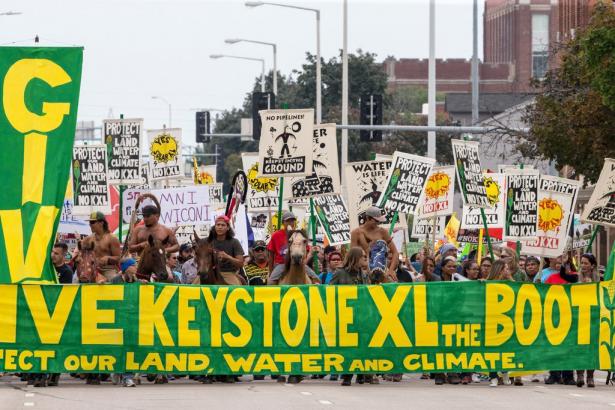WASHINGTON — As the Trump administration has moved aggressively to roll back environmental protections and speed up oil and coal projects, it has repeatedly been blocked by courts finding that the administration did not follow longstanding rules in making its sweeping changes.
Now, a federal judge has issued a repudiation of one of President Trump’s first acts as president, his decision to allow the disputed Keystone XL oil pipeline to proceed, saying that the administration failed to present a “reasoned explanation” for the move and “simply discarded” the effect the project would have on climate change.
The decision could thrust the White House into a contentious new legal battle over climate change.
The judge’s finding quickly drew fire from Mr. Trump, who has elevated the pipeline as a prominent symbol of his administration’s effort to encourage fossil fuel use. “It was a political decision made by a judge,” said Mr. Trump on Friday, speaking to reporters at the White House. “I think it’s a disgrace.”
The ruling, by Judge Brian Morris of United States District Court for Montana, blocked construction on the 1,179-mile pipeline, which would carry 800,000 barrels a day of petroleum from the Canadian oil sands to the Gulf Coast and has, over the past decade, become a lighting rod in broader political battles over energy, the environment and climate change. While experts have long said that the substantive impact of the pipeline on jobs, climate change and the nation’s energy economy is small, it has nonetheless taken on an outsize prominence in the national discussion.
Judge Morris, an Obama appointee, didn’t respond to a request for comment on the president’s remarks.
“This has been typical of the Trump administration,” said Mark Squillace, an expert on environmental law at the University of Colorado Law School. “They haven’t done a good job dealing with the factual findings of the previous administration. The courts have been clear that you can change your position, even if it’s for a political reason. But you have to show your work, how you got from Point A to Point B.”
The decision leaves plenty of room for the Trump administration or TransCanada, the company building the pipeline, to appeal. Analysts said that if it did so armed with a deeply researched analysis arguing its position, it could well reverse the finding.
“It’s feasible, if they do the work, and show their work, and they explain, with serious, fact-based analysis, why they’re choosing a different outcome, that the courts would uphold it,” Mr. Squillace said.
When President Barack Obama rejected the Keystone permit in 2015, he was weeks away from negotiating an international global warming accord in Paris, and he sought to use the move as a symbol of his global leadership on climate change. He argued the pipeline would undercut United States leadership in curbing global reliance on fossil fuels.
Two days after Mr. Trump took office, though, he made Keystone a symbol of the post-Obama era of climate policy and energy, signing an executive order overturning Mr. Obama’s rejection of the pipeline. That move signaled that Mr. Trump would be moving forward with an aggressive effort to more substantively dismantle Mr. Obama’s climate change legacy — including withdrawing the United States from the Paris accord.
In saying that no work can go forward until the government more fully reviews the pipeline’s environmental impact, the ruling further stokes the political battles over climate change by a president who dismisses mainstream science and whose administration is also seeking to block a landmark lawsuit on behalf of children asking the government to stop the rise of planet-warming gases.
Construction on many portions of the pipeline has already been competed. At issue is the final phase, a leg that would run from Steele City, Neb., through Montana to Canada.
Still, environmental groups hailed the move as a victory in the battle over Keystone, which has spanned more than a decade. “Keystone XL would be a disaster for the climate and for the people and wildlife of this country,” Jackie Prange, senior attorney at the Natural Resources Defense Council, said in a statement Thursday.
The oil industry characterized the move as the latest turn of the screw in the long-running legal battle. “Pipelines like KXL are the backbone of our nation’s energy infrastructure and one of the most environmentally sound ways to transport the fuel and petroleum products that power America,” said Robin Rorick, vice president of midstream operations for the American Petroleum Industry, which lobbies for oil companies.
“The pipeline has passed every environmental review conducted for it. In fact, a total of six assessments by both the Obama and Trump administrations concluded that KXL is safe to build,” Mr. Rorick said. “Calls to conduct identical environmental reviews makes no sense and are a waste of tax dollars.”


Spread the word